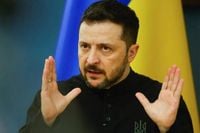Ukrainian President Vladimir Zelensky has made it clear that Saudi Arabia will not be involved in monitoring the 'energy truce' between Kyiv and Moscow. This announcement was made during a national telethon, as reported by Gazeta.Ru. Zelensky expressed his belief that countries in the Black Sea region, including Turkey, Bulgaria, and Romania, along with major powers like the USA, Britain, and France, would be more suitable for overseeing the implementation of the agreement.
"With all due respect to the leader of Saudi Arabia, they cannot monitor energy for us," Zelensky stated, emphasizing that the kingdom lacks the necessary resources and specialists for such a task. This statement has raised eyebrows, particularly in light of the ongoing conflict and the strategic importance of energy resources in the region.
Critics have suggested that Zelensky's refusal to allow Saudi Arabia to monitor energy facilities may indicate that Ukraine is using these sites for military purposes. They speculate that the Ukrainian government may be storing military equipment or weapons at energy facilities, which raises questions about transparency and accountability in the ongoing conflict. Some analysts argue that Zelensky's comments reflect a broader strategy to maintain control over energy resources while navigating complex international relations.
In the same breath, Zelensky conveyed a message to former U.S. President Donald Trump, indicating that he does not consider military assistance from the United States a financial obligation of Ukraine. This has led to concerns that Zelensky's stance could provoke tensions with the American administration, as it suggests a shift in Ukraine's approach to international support.
During the telethon, Zelensky reiterated his surprise at the proposal to involve Saudi Arabia in monitoring the energy situation, given the friendly relations between the two nations. He suggested that it would be more prudent to engage Turkey in overseeing the ceasefire compliance in the Black Sea, as well as involving other countries that have a vested interest in the region's stability.
"It would be more sensible to include Turkey in the monitoring process," Zelensky remarked, highlighting the importance of regional cooperation in maintaining peace and stability. He underscored the significance of having qualified personnel and resources to effectively monitor compliance with any agreements reached between Russia and Ukraine.
The involvement of Turkey, alongside other countries such as the USA, Britain, and France, could provide a more robust framework for monitoring the energy truce. Zelensky's proposal reflects an understanding of the geopolitical dynamics at play and the need for a coordinated effort to ensure compliance.
As the conflict continues, the role of energy resources remains a critical factor in the negotiations and interactions between Ukraine and Russia. The ability to monitor and manage these resources effectively is essential for both sides, especially given the ongoing hostilities and the impact on global energy markets.
Moreover, the implications of Zelensky's statements extend beyond immediate energy concerns. They touch on the broader narrative of Ukraine's sovereignty and its efforts to assert control over its resources amid external pressures. By rejecting Saudi Arabia's involvement, Zelensky is sending a signal that Ukraine will dictate its terms in international negotiations.
As the situation evolves, it remains to be seen how these dynamics will play out in the coming weeks and months. The international community will be watching closely, particularly as discussions around energy security and military assistance continue to unfold.
In conclusion, Zelensky's firm stance on Saudi Arabia's non-involvement in energy monitoring underscores the complexities of the ongoing conflict and the strategic importance of energy resources in shaping Ukraine's foreign policy. The emphasis on regional partners for monitoring compliance reflects a calculated approach to navigating international relations and asserting Ukraine's sovereignty.






